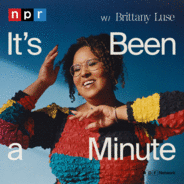
Kultur & Gesellschaft
It's Been a Minute Folgen
Want in on a secret? Your likes and dislikes didn't develop by accident. There are subtle and not-so-subtle forces around you, shaping what you think, how you act, and even who you think you are. Brittany Luse is here to break the spell and help you feel wiser in a society that makes things blurry.THE BEST POP CULTURE PODCAST AWARD WINNER AT THE 2025 SIGNAL AWARDSIt’s Been A Minute with Brittany Luse is the best podcast for understanding what’s going on in culture right now, and helps you consume it smarter. From how politics influences pop culture to how identity influences tech or health, Brittany makes the picture clearer for you every Monday, Wednesday, and Friday.It’s Been A Minute reaches millions of people every week. Join the community and conversation today.If you can't get enough, try It's Been a Minute Plus. Your subscription supports the show and unlocks a sponsor-free feed. Learn more at plus.npr.org/itsbeenaminute
Folgen von It's Been a Minute
-
Folge vom 15.12.2025The Winners & Losers of 2025Welcome to the third annual IBAMMYs Culture Awards Show, where we reflect and honor the best and worst cultural moments of the year.Brittany is joined by Sam Sanders, host of KCRW's The Sam Sanders Show, and Tre'vell Anderson, host of The Seated podcast. All three nominated a person or moment for each of the four categories. NPR's Culture Committee then voted on a winner. Today, we reveal the winners and losers of 2025 and run through the moments we want to remember or forget.This year's categories & nominees are:Word of the Year:"Slop""Clock it""Labubu"Villain of the Year:Sydney SweeneyGlinda the Good WitchBillionairesThe Candle in the Dark:PinkPantheressOne of Them DaysLinikerNot-on-My-Bingo Card:KPop Demon HuntersYolanda AdamsKaty PerryWho will win?(0:00) How will you look back on 2025?(2:30) The Word of the Year: Slop, Clock It, or Labubu?(7:51) Villain of the Year: Sydney Sweeney, Billionaires, Wicked Glinda?(18:07) What brought you joy this year?(23:23) Not-on-my-Bingo Card: Kpop Demon Hunters, Yolanda Adams, Katy PerrySupport Public Media. Join NPR Plus.Follow Brittany Luse on Instagram: @bmluseFor handpicked podcast recommendations every week, subscribe to NPR’s Pod Club newsletter at npr.org/podclub.Learn more about sponsor message choices: podcastchoices.com/adchoicesNPR Privacy Policy
-
Folge vom 12.12.2025The secret to Heated Rivalry's successHeated Rivalry - the hit HBO Max series - has it all: scintillating romance, hot guys, sports (kind of), and, most importantly, portrayals of gay love and sex that don’t hold back. Steamy, sensual TV shows aren’t new, but the Canadian series has captured the public's attention in a way that a show hasn’t in a while. So, what’s behind its cultural resonance? What does it mean that this gay romance was written by a woman? And why are straight women and gay men equally into the sex scenes?Michel Ghanem, TV critic and columnist of “Appointment Viewing” for The Cut, and Glen Weldon, co-host of NPR’s Pop Culture Happy Hour, join the show to get into why we’re all waiting for every new episode with bated breath. (0:00) What is Heated Rivalry really about?(2:40) How successful is the gay TV show?(6:05) Why are straight women into gay romance?(9:25) Why all audiences see something new in the sex scenes(12:12) Can straight actors play queer characters?(18:30) "Wait, What?!" A Pop Culture Trivia GameSupport Public Media. Join NPR Plus.Follow Brittany Luse on Instagram: @bmluseFor handpicked podcast recommendations every week, subscribe to NPR’s Pod Club newsletter at npr.org/podclub.Learn more about sponsor message choices: podcastchoices.com/adchoicesNPR Privacy Policy
-
Folge vom 10.12.2025That friend's wedding is too dang expensive…Are we spending too much on other people’s weddings?Going to a friend's weddings can be so fun and meaningful… but it can also really hurt your wallet. A survey by LendingTree found that 31% of people who had been to a wedding in the past five years had accrued debt to attend. So what’s driving up the cost of weddings for guests? And what makes it so hard to say no to these expenses?Brittany breaks it down with Allyson Rees, senior analyst at trend forecasting firm WGSN, and Annie Joy Williams, assistant editor at The Atlantic.(0:00) For hosts AND guests, weddings are getting really expensive(2:22) How much it costs to attend someone's wedding(4:58) Men are spending just as much as women(7:30) Weddings, social media, and "main character" energy(11:32) Is this the one night we get to pretend we're ultra rich?(13:42) How to say no to a friend's wedding(17:00) Do weddings prove who your friends really are?Support Public Media. Join NPR Plus.Follow Brittany Luse on Instagram: @bmluseFor handpicked podcast recommendations every week, subscribe to NPR’s Pod Club newsletter at npr.org/podclub.Learn more about sponsor message choices: podcastchoices.com/adchoicesNPR Privacy Policy
-
Folge vom 08.12.2025Do kids need a dad? Ask single moms.More women than ever are choosing to raise their children by their self. Is it time to hit reset on what we mean by "family" in America?America has some deeply held prejudices toward single moms, but some studies show that 40% of babies in the U.S. are born to unmarried women. In this episode Brittany looks into the joy and challenges these women face - from freedom and agency to affordability and loneliness.Brittany is joined by Pallavi Gogoi, NPR's Chief Business Editor, and Danielle Elliot, writer and a single mother. You can read Pallavi's reporting here.(0:00) Hitting reset on the definition of "family" and "single mom"(5:42) The power & agency of being a single mom(7:30) Does your child need a present father? (15:11) The struggles of being a single parent(18:29) Tips for raising a kid by yourselfSupport Public Media. Join NPR Plus.Follow Brittany Luse on Instagram: @bmluseFor handpicked podcast recommendations every week, subscribe to NPR’s Pod Club newsletter at npr.org/podclub.Learn more about sponsor message choices: podcastchoices.com/adchoicesNPR Privacy Policy
